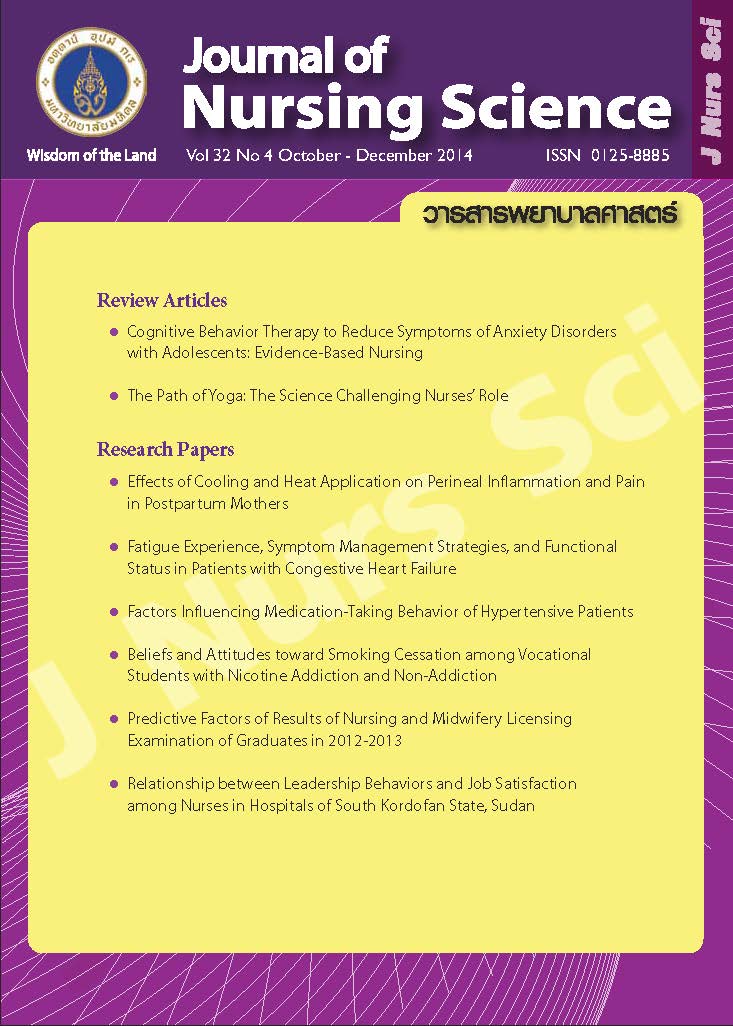Factors Influencing Medication-Taking Behavior of Hypertensive Patients
Main Article Content
Abstract
Purpose: To examine predictive factors of gender, age, educational level, income, perceived severity of hypertension, and perceived self-efficacy on medication-taking behavior of hypertensive patients.
Design: Correlational predictive design.
Methods: The subject consisted of 98 essential hypertensive patients who received hypertensive drugs and came for treatment and follow-up at hypertension clinic, out-patient department, university hospital, Thailand. Questionnaires were used for data collection. Data were analyzed by using descriptive statistics, Pearson’s product moment correlation coefficient, and multiple regression analysis.
Main findings: The medication-taking behavior of hypertensive patients was at a very good level. Perceived severity of hypertension and perceived self-efficacy to medication-taking behavior had statically significant positive correlations with medication-taking behavior (r = .444, p <.01; r = .550, p < .01) whereas educational level had a negative relationship with medication-taking behavior (r = -.260, p < .01). Level of education, perceived severity of hypertension, and perceived self-efficacy to medication-taking behavior could jointly predict 38.9% of the variance in medication-taking behavior (R2 = .389, p < .01).
Conclusion and recommendations: According to the study findings, health care providers should inform the patients about the severity of hypertension and enhance their perceived self-efficacy for long-term adherence to regimen.
Keywords: medication-taking behavior, perceived self-efficacy, perceived severity, hypertension
ปัจจัยที่มีผลต่อพฤติกรรมการรับประทานยาของผู้ป่วยโรคความดันโลหิตสูง
บทคัดย่อ
วัตถุประสงค์: เพื่อศึกษาอำนาจการทำนายของปัจจัยด้านเพศ อายุ ระดับการศึกษา รายได้ การรับรู้ความรุนแรงของโรคความดันโลหิตสูง และการรับรู้สมรรถนะของตนเองต่อพฤติกรรมการรับประทานยาของผู้ป่วยโรคความดันโลหิตสูง
รูปแบบการวิจัย: การวิจัยเชิงทำนายความสัมพันธ์
วิธีดำเนินการวิจัย: กลุ่มตัวอย่างคือ ผู้ป่วยโรคความดันโลหิตสูงชนิดไม่ทราบสาเหตุ 98 คน ที่รับประทานยาความดันโลหิตสูงและมาติดตามการรักษาท่คี ลินิกโรคความดันโลหิตสูง เก็บข้อมูลโดยใช้แบบสอบถาม วิเคราะห์ข้อมูลโดยใช้สถิติพรรณนา ค่าสัมประสิทธิ์สหสัมพันธ์ของเพียร์สัน และการวิเคราะห์ความถดถอยแบบพหุคูณ
ผลการวิจัย: พฤติกรรมการรับประทานยาของผู้ป่วยโรคความดันโลหิตสูงอยู่ในระดับดีมาก การรับรู้ความรุนแรงของโรคความดันโลหิตสูง และการรับรู้สมรรถนะของตนเองต่อพฤติกรรมการรับประทานยา มีความสัมพันธ์ทางบวกกับพฤติกรรมการรับประทานยาอย่างมีนัยสำคัญทางสถิติ (r = .444, p < .01; r = .550, p < .01) ตามลำดับ โดยระดับการศึกษามีความสัมพันธ์ทางลบกับพฤติกรรมการรับประทานยาอย่างมีนัยสำคัญทางสถิติ (r = - .260, p < .01) ระดับการศึกษา การรับรู้ความรุนแรงของโรคความดันโลหิตสูง และการรับรู้สมรรถนะของตนเองต่อพฤติกรรมการรับประทานยา สามารถร่วมกันทำนายความแปรปรวนพฤติกรรมการรับประทานยาของผู้ป่วยโรคความดันโลหิตสูงได้ร้อยละ 38.9 (R2 = .389, p < .01)
สรุปและข้อเสนอแนะ: จากผลการศึกษาครั้งนี้ บุคลากรด้านสุขภาพควรให้ความรู้แก่ผู้ป่วยเกี่ยวกับความรุนแรงของภาวะความดันโลหิตสูง และควรส่งเสริมการรับรู้สมรรถนะของตนเองเพื่อการรับประทานยาตามแผนการรักษาอย่างต่อเนื่อง
คำสำคัญ: พฤติกรรมการรับประทานยา การรับรู้สมรรถนะของตนเอง การรับรู้ความรุนแรง โรคความดันโลหิตสูง
Article Details
Copyright Notice: Nursing Science Journal of Thailand has exclusive rights to publish and distribute the manuscript and all contents therein. Without the journal’s permission, the dissemination of the manuscript in another journal or online, and the reproduction of the manuscript for non-educational purpose are prohibited.

Disclaimer: The opinion expressed and figures provided in this journal, NSJT, are the sole responsibility of the authors. The editorial board bears no responsibility in this regard.


